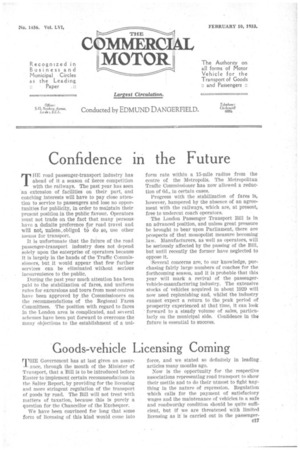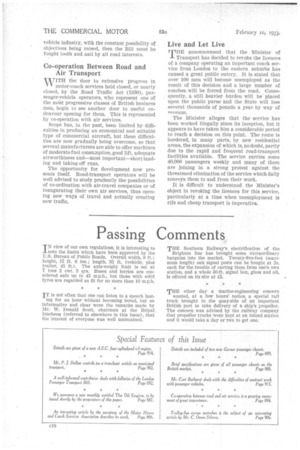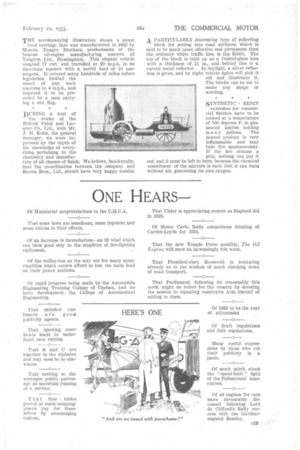Goods-vehicle Licensing Coming
Page 67

Page 68

Page 69

If you've noticed an error in this article please click here to report it so we can fix it.
T' Government has at last given an assurance, through the mouth of the Minister of Transport, that a Bill is to be introduced before Easter to implement certain recommendations in the Salter Report, by providing for the licensing and more stringent regulation of the transport of goods 'by road.. The Bill will not treat with matters of taxation, because this is purely a question for the Chancellor of the Exchequer.
We have -been convinced for long that some form of licensing of this kind would come into force, and we stated so definitely in leading articles many months ago.
Now is the opportunity for the respective associations representing road transport to show their mettle and to do their utmost to fight anything in the nature of repression. Regulation which calls for the payment of satisfactory wages and the maintenance of vehicles, in a safe and roadworthy condition should be quite sufficient, but if we are threatened with limited licensing as it is carried out in the passenger vehicle industry, with the constant possibility of objections being raised, then the Bill must be 'fought tooth and nail by all road interests.
Co-operation Between Road and Air Transport
wiTH the door to extensive progress in / motor-coach services held closed, or nearly closed, by the Road Traffic Act (1930), passenger-vehicle operators, who represent one of the most progressive classes of British business men, begin to see another door to useful endeavour opening for them. This is represented by co-operation with air services. Scope bas, in the past, been limited by difficulties in producing an economical and suitable type of commercial aircraft, but these difficulties are now gradually being overcome, so that several manufacturers are able to offer machines of moderate fuel consumption, good lift, adequate airworthiness and—most important—short landing and taking-off runs. The opportunity for development now presents itself. Road-transport operators will be well advised to study prudently the possibilities of co-ordination with air-travel companies or of inaugurating their own air services, thus opening new ways of travel and actually creating new traffic.
Live and Let Live
THE announcement that the Minister of Transport has decided to revoke the licences of a company operating an important coach service from London to the eastern suburbs has caused a great public outcry. It is stated that over 100 men will become unemployed as the result of this decision and a large number of coaches will be forced from the road. Consequently, a still heavier burden will be placed upon the public purse and the State will lose several thousands of pounds a year by way of revenue.
The Minister alleges that the service has been worked illegally since its inception, but it appears to have taken him a considerable period to reach a decision on this point. The route is bordered, in many parts, by new residential areas, the expansion of which is, no doubt, partly due to the rapid and frequent road-transport facilities available. The service carries some 40,000 passengers weekly and many of them are joining in a strong protest against the threatened elimination of the service which daily conveys them to and from their work.
It is difficult to understand the Minister's object in revoking the licences for this service, particularly at a time when unemployment is rife and cheap transport is imperative. THE accompanying illustration shows a steam road carriage that was manufactured in 182 by Messrs. Tangye Brothers, predecessors of the famous oil-engine manufacturing concern of Tangyes, Ltd., Birmingham. This elegant vehicle weighed 27 cwt. and travelled at 20 m.p.h. in no uncertain manner with a useful load of 10 passengers. It covered many hundreds of miles before legislation limited the speed of any such machine to 4 m.p.h., and required it to be preceded by a man carrying a red flag.
DURING a tour of the works of the British Paint and Lacquer Co., Ltd., with Mr. J. M. Kuhn, the general manager, we were impressed by the depth of his knowledge of everything pertaining to the chemistry and manufacture of all classes of finish. We believe, incidentally, that the co-ordination between the company and BIOWIl Bros., Ltd., should have very happy results. A PARTICULARLY interesting type cf reflecting block for setting into road surfaces, which is said to be much more effective and permanent than the ordinary white traffic line, is the BiIdle. The top of the block is built up as a frosted-glass lens with a thickness of 1 in., and behind this is a curved metal reflector. In daylight, a silver reflection is given, and by night vehicle lights will pick it out and illuminate it. The blocks can be set to make any shape or wording.
SYNTHETIC RESIN varnishes for commercial finishes have to be cooked at a temperature of 500 degrees F. in gashealed kettles holding many gallons. The heated product is very inflammable and may take fire spontaneously. If the fire obtains a grip, nothing can put it out, and it must be left to burn, because the chemical . constituent of the mixture is such that it can burn without air, generating its own oxygen.




































































































































































